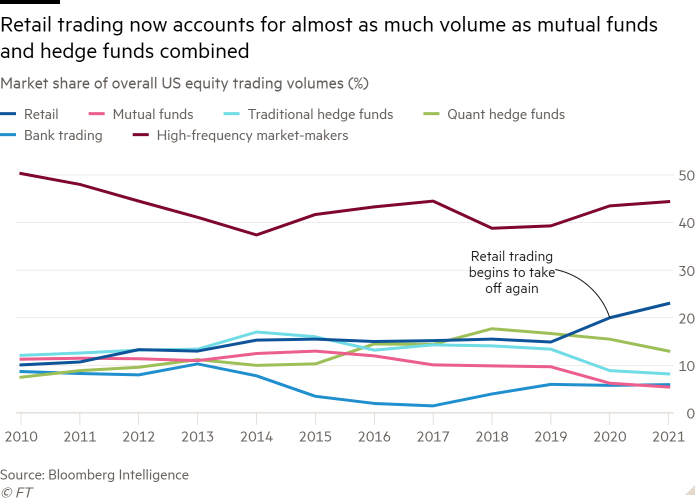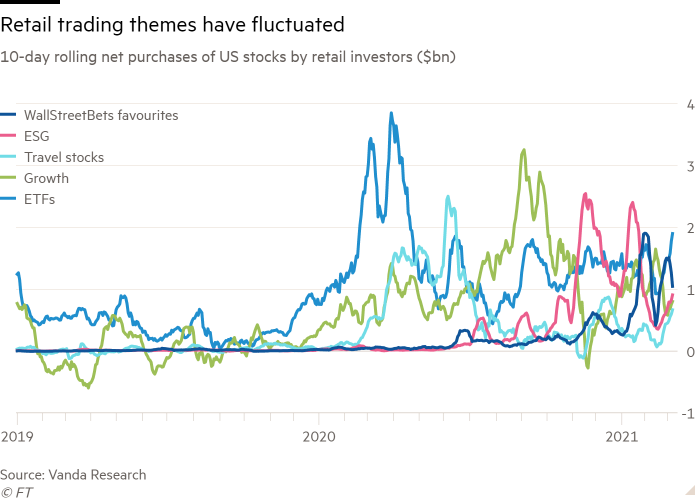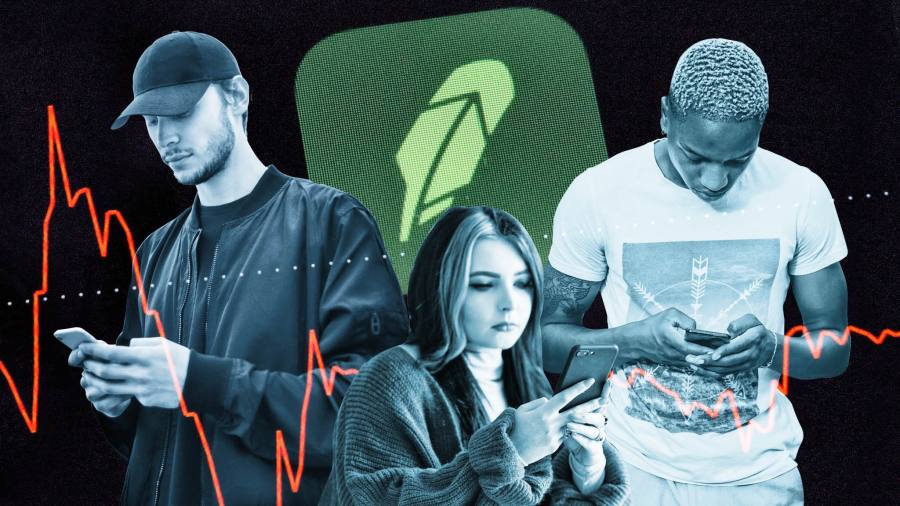[ad_1]
When newcomers discover Robinhood, and decide to use the zeitgeist US trading platform to punt around in stocks, many of them have questions. Chief among them, it seems, is “what is the stock market?â€.
Along with “what is the S&P 500?â€, that is one of the most commonly visited educational pages on the broker’s website, according to a new paper by academics at Oklahoma State and Emory universities. But what Robinhood’s army of untrained investors lacks in market knowledge, it more than makes up for in enthusiasm and impact.
A few months ago, these so-called retail traders were a quirky sideshow in US stocks, dabbling in markets to fend off the boredom of coronavirus lockdowns essentially fee-free, thanks to a price war kicked off by Robinhood in 2019. Under the online rallying cry that “stocks only go upâ€, they demonstrated an optimism about the economic outlook that was often lacking among professional fund managers, pumping up some stocks that others would not touch. They ended up piggybacking on a historic rally in equities that has now been running for nearly a year.
Few in the investment industry took this long-maligned “dumb money†seriously. Market veterans have pointed to the fizzing retail investment trend — packed up in an online culture strewn with crass jokes and insults — as a sign that markets are about to top out, and confidently predicted a cull of naive retail traders next time markets tumble.
But a serious pullback has yet to land, and 2021 has proven to be a breakthrough year for the amateur traders. Credit Suisse estimates that at times this year they have accounted for a third of all US stock market trading. Having demonstrated an ability to move markets, retail traders are now a community of market participants that savvy investors want to understand and plug in to their own trading models. The flows are now large enough to count.

“The can of worms is open,†says Eric Liu, head of research at Vanda Research, which has lately turned its attention to tracking the behaviour of amateur investors. “If you break free of this belief that fundamentals matter to markets, then you look to this.†Hedge funds, sovereign wealth funds, banks and other market professionals are poring over this kind of data, he says.
The burning question on Wall Street is whether this burst of hyperactive retail trading is a temporary coronavirus-inspired phenomenon that will inevitably ebb once markets next crash — as happened after the dotcom boom and bust — or the start of a new regime driving the US stock market.Â
“Powerful waves of passive and systematic investment long made retail investors largely irrelevant when framing market forecasts . . . until now,†says Alain Bokobza, head of global asset allocation at Société Générale. “Rather than criticising retail investors and their behavioural patterns, it is better to slot them into the money equation.â€


Amateurs moving markets
The GameStop trading frenzy is the most explosive and visible example of a shift in market power that has been building in plain sight for more than a year. In January, shares in the video gaming retailer rocketed higher as amateur investors, sharing a wealth of ideas on social media sites such as Reddit, zeroed in on the beaten-up stock and crushed hedge funds that had been shorting it in expectation that the seller of new and old video games was toast in the digital age.
The 2,000 per cent rally in GameStop shares unravelled within days. But the potential for a rerun in favoured stocks is strong. Already, GameStop shares have made another shot at the moon. They are still up by more than 700 per cent so far this year.

Many in the industry point out that the market-moving power of amateur traders is more than a fleeting fad focused on a narrow set of stocks. Vanda’s Liu compares it to the transformative shift away from active money managers into passive investing that followed the 2008 financial crisis. “We are on a moving train,†he says. “In the past year, we have yet to see a major thematic move that’s not been sponsored by retail.â€
For other participants seeking to divine retail traders’ next steps, Liu’s analysis suggests that the amateurs are drawn “from one hot theme to the nextâ€. Last spring, for instance, they hopped on to the so-called “reopening tradeâ€, buying shares in airlines such as Delta and cruise ship operators such as Carnival in the expectation — or hope — that lockdown conditions would lift quickly. At times they accounted for a half or more of all trading in these stocks.

Then they moved on to big technology stocks. Vanda says in some weeks last year, they accounted for as much as half of all trading in Apple — the biggest beast of the US stock market. The next big push was electric vehicle stocks such as Tesla, and then sustainable investments as the US election drew closer, betting on the likelihood of a Biden administration in the White House. Finally, January brought the bullish assault on heavily-shorted names such as GameStop and cinema operator AMC, changing the game for short-sellers for ever.
“We think the GameStop event will drive net positions on equities longer as asset managers will now think more than twice before opening shorts,†Bokobza says. “They no longer have any choice but to take on board the specific behavioural patterns of a new breed of investor.â€
‘You only live once’
The retail trading boom is a global phenomenon, with stock trading clubs, messaging groups, chat forums and even “rooms†on audio social networking site Clubhouse mushrooming across the world, from South Korea to Norway. But the US is the epicentre of an international stock market earthquake.
Larry Tabb, a veteran market structure analyst at Bloomberg Intelligence, estimates that ordinary retail investors have on average accounted for 23 per cent of all US equity trading in 2021, more than twice the level of 2019. That means their stock market footprint is roughly as big as all hedge funds and mutual funds combined, and trail only behind high-frequency traders in their hyperactivity.
Their heft is being felt. Deutsche Bank believes the horde of new US retail investors has been “a key driver behind the speed, duration and composition†of the equity market rally that has been running since late March 2020.
Robinhood is thought to have around 13m users now. Analysis firm Apptopia says the broker’s app was downloaded 3.4m times just in January this year. But the incumbent brokerages are also still drawing in a crowd. The likes of Charles Schwab, Interactive Brokers and E*Trade also added millions of new trading accounts last year. Fidelity alone added 3.7m in 2020, according to its annual report.
The r/WallStreetBets forum on Reddit that led the GameStop charge now boasts 9.4m members — or “degeneratesâ€, as they call themselves — up fivefold since the start of the year, and more than 10 times since the start of 2020.
A Deutsche Bank survey found that almost half of US retail investors were completely new to the markets in the past year. They are young, mostly under 34. And they are aggressive: much more willing than those more experienced in stock markets to borrow to fund their bets, to make heavy use of options to fire up wagers on stocks, and to use social media as a research tool to find trading ideas.

Survey respondents told the bank they planned to put 37 per cent of any forthcoming stimulus cheques from the government into stocks. That could be as much as $170bn. In the event of a drop in stock markets, they do not intend to back out. They intend to put more money in.
“It has always been a contrarian indicator when you have large-scale retail investment,†says Kasper Elmgreen, head of equities at Amundi, the French asset management group. “We saw that in the late 1990s, when taxi drivers were talking about stocks. It’s a warning sign. But the combination of retail investors and social media is a force to be reckoned with.â€
Elmgreen believes that when vaccines have been pumped in to enough arms to facilitate a return to work and office life, some of this retail enthusiasm will fade away. Yet the Deutsche Bank survey suggests that may not be the case, with retail investors saying that they plan to maintain or add to stock holdings when the economy reopens.
In this and other ways, it is clear that the new generation of retail investors is different. In the 1990s — the last big moment for amateur speculation that ended with the dotcom boom and bust — the mean retail investor was 50 years old and had around $47,000 to play with, the Oklahoma State and Emory paper notes. Now, he or she is younger, around 31, and has less to invest — between $1,000 and $5,000, and the mindset is new.
“The motto of the Reddit crowd is YOLO. ‘You only live once’ is not a motto for saving for retirement,†says Jordi Visser, chief investment officer at Weiss Multi-Strategy Advisers, a hedge fund. “I don’t think enough people take to heart what these words mean. This millennial crowd wants to invest in the long shots, not save.â€
Gambler’s mindset
Some of the investment industry’s old guard think the current frenzy is abhorrent. Charlie Munger, the 97-year-old vice-chairman of Berkshire Hathaway, recently described the GameStop episode as a “frenzy†led by a “new bunch of gamblers†who have “the mindset of racetrack bettersâ€.
Robinhood responded that Munger’s views were “disappointing and elitistâ€. The response on r/WallStreetBets was more partisan. In one of the more printable comments, Reddit user ever_onward said: “Mind your own business grumpy gramps.â€
It may still be the case that the end of pandemic lockdowns breaks the spell, or even that new regulation could hit the brakes on commission-free trading. The latest drop in bond prices serves up the real possibility that retail traders’ favourite bets could fall back to earth with a bump.
Yet, many on Wall Street are beginning to believe that this retail boom is likely to prove more durable than previous episodes. They point to changes since the dotcom bubble that combined are likely to have far-reaching consequences beyond the pandemic: the emergence of free trading; the ability to trade fractions of shares; improved user interfaces and connection speeds; cheaper and easier access to leverage; and the growth of social media.Â
Robinhood’s breakthrough came thanks to its pioneering of commission-free trading, but by the end of 2019 all its big establishment competitors had followed suit. At the same time, brokerages started letting investors trade fractions of shares, meaning that even $50 is enough to buy a slice of Amazon stock currently worth about $3,000.Â
Retail investors can now easily trade on the bus, at home, or over university lunch breaks on sleekly-designed smartphone apps, while the dotcom boom happened in the pre-broadband era and almost a decade before the birth of the iPhone. Access to leverage — in the form of “margin†loans from brokerages or financial derivatives like options — is also freer than ever before. US margin debt soared to a record $799bn in January.Â
The power of social media brings all these factors to the boil. Whether it is Reddit’s WallStreetBets forum, Twitter, WhatsApp messaging groups, live trading sessions streamed and discussed on sites like Discord or Twitch — primarily used by video gamers — social media is adding vim to the trend.Â
While there were internet forums and newsletters in the 1990s, the current social media environment is radically more powerful, investors and analysts say. For many, there is no way to recork the retail trading genie, and the mainstream investment industry simply has to adapt.Â
“As you democratise trading and investing . . . there’s never a way back. You don’t see commissions going up,†says Liu at Vanda. He takes a sardonic view of retail investors’ strategies, and their possible implications. “I don’t share this concern that markets are no longer trading on fundamentals. They have not traded on fundamentals for a long time.â€
Additional reporting by Madison Darbyshire in London
[ad_2]
Source link










